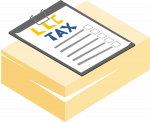New Hampshire LLC Taxes
LLCs in New Hampshire are classified as pass-through entities by default, with LLC members paying federal income tax through their own individual returns. On the state level, New Hampshire also directly taxes LLCs making income over certain thresholds through a business profits tax and a business enterprise tax. While it has no general state income tax, LLC members may be subject to a tax on interest and dividend income until it is phased out in 2027. There is no statewide or local sales tax, but employer taxes and taxes on specific industries may apply.
In this article, we’ll cover:


How Are New Hampshire LLCs Taxed?
Your New Hampshire LLC’s tax classification depends on its number of members. Single-member LLCs (SMLLCs) are taxed like sole proprietors by default, and multi-member LLCs are taxed as general partnerships. Unless members elect to choose different status, LLCs are pass-through entities, meaning revenue passes through and is paid by members on personal income tax returns. Meanwhile, the LLC pays no corporate income tax, though it may qualify for state-level business profits and enterprise taxes.
LLCs under default classification use these forms to file federal taxes:
- Single-member LLC—Form 1040 (usually Schedule C, but some SMLLCs file C-EZ, E, or F)
- Multi-member LLC—Form 1065
However, LLCs are not limited to default tax classification—they can also elect S-corp or C-corp tax status. Here’s what that means for you and your LLC:
New Hampshire LLCs taxed as S-corp
Some LLCs benefit from S-corp status—businesses classified as S-corps pay no corporate income tax, and can make member distributions without having to pay the 15.3% federal self-employment tax on those distributions.
Your LLC can file for S-corp status with IRS Form 2553. Before filing, make sure your LLC is eligible under the IRS S-corp requirements. Only US-originating companies with certain caps on their amount of shareholders and stock can become S-corps. It is also recommended to consult a CPA on whether S-corp status will be worth your while—S-corp returns (through IRS Form 1120-S) are more complicated than standard income tax returns, and not all LLCs will save money with S-corp classification.
LLCs taxed as C-corp
Though uncommon, some LLCs opt for C-corp status, the default tax classification for corporations. C-corps face “double-taxation,” with the company paying 21% federal corporate income tax and shareholders paying 15.3% self-employment tax on dividends. On the other hand, C-corps are eligible for more tax breaks than standard LLCs or S-corps receive, and often appeal more to investors, which can outweigh the drawbacks for LLCs looking for private equity or venture capital backing.
Before filing for C-corp tax status with the IRS (Form 1120), check with a CPA to see if your LLC will benefit from the change in status.

New Hampshire State Taxes
New Hampshire has no official state income tax on individuals or businesses. However, depending on income, LLCs may be required to pay the state’s Business Enterprise Tax and Business Profits Tax to the Department of Revenue Administration—and both an LLC and its members can potentially be liable for New Hampshire’s Interest and Dividends Tax.
Regardless of your LLC’s federal tax classification with the IRS, New Hampshire treats LLCs like partnerships for the purpose of filing deadlines for the BET and BPT, which are both due on the 15th day of the third month after the end of the LLC’s taxable period—for most businesses, March 15th.
Business Enterprise Tax
The Business Enterprise Tax is based on the “enterprise value tax base” of a business: the sum of all compensation and interest paid or accrued by the business—or on the gross receipts of a business. The Business Enterprise Tax rate is 0.55%. For both gross receipts and enterprise value tax base, totals must exceed $250,000 to qualify for the tax as of 2023 (the threshold is adjusted for inflation every two years). You can file the Business Enterprise Tax with the BET tax return form.
Business Profits Tax
New Hampshire’s Business Profits Tax is assessed on income from business conducted in the state. As of 2023, the Business Profits Tax rate is 7.6%, assessed on gross income over $92,000 (the rate will drop to 7.5% starting in 2024). File the Business Profits Tax with Form NH-1065. Business Enterprise Tax can be used as a credit towards the Business Profits Tax.
Interests and Dividends Tax
The last major state tax that LLCs and their members need concern themselves with is the Interest and Dividends Tax. All individuals and LLCs (along with certain other businesses) must pay the I&D Tax on any gross interest or dividend income exceeding $2,400 in a year. Currently, the I&D tax rate is 5%, but starting at the end of 2023, that rate will drop to 4% as New Hampshire begins phasing out the I&D tax—repealing it at the end of 2026. Until 2026, however, you can file the I&D tax return with Form DP-10.

Sales and Use Tax
New Hampshire is one of four states with no general sales and use tax or local sales taxes at the city or county level. However, taxes are applied to gasoline and diesel fuel sales at 23.83 cents per gallon, and a 9% Meals & Rooms (Rentals) Tax applies to restaurants, hotels and similar businesses. These taxes are generally passed through to the customer at sale, much the same as a conventional sales tax. Sales of beer, cigarettes, vapor products and other tobacco products are also taxed at variable rates.

Local New Hampshire Taxes
Virtually all city and county taxes in New Hampshire are applied through property tax. Outside of business licensing in your city or county of operation, your LLC will likely only pay local taxes if it owns its property (or pay indirectly through rental charges). Local property taxes vary, but on average, New Hampshire’s property tax rate comes to about 1.86%.

Other Taxes in New Hampshire
Here are some other taxes that are imposed by the state of New Hampshire.
New Hampshire State Employer Taxes
New Hampshire employers must pay unemployment insurance and workers’ compensation taxes:
- Unemployment Insurance (UI) Tax—The first $14,000 of an employee’s yearly wage is taxed a percentage for unemployment insurance. New employers pay 2.7% for their first year in operation. After that point, a new rate is issued each September. Family members working for an LLC are not required to be covered under unemployment.
- Workers’ Compensation—New Hampshire employers are required to purchase workers’ comp insurance for all employees (LLCs with less than four members do not need to acquire workers compensation insurance for those members, but it is required once a fourth member joins). Rates vary based on claim history and the risk involved in the work your employees do, but New Hampshire’s rate averages out to 90 cents per $100 of payroll. Companies that do not provide workers compensation coverage can be liable for a $2,500 base fine, plus $100 per employee per day without coverage.
To learn more about New Hampshire employer taxes, visit the New Hampshire Employment Security website.
Industry Taxes
The New Hampshire Department of Revenue also taxes certain industries in the state, including:
- Communications Services Tax
- Electricity Consumption Tax
- Excavation/Gravel Tax
- Timber Tax
- Tobacco Tax

Do foreign LLCs in New Hampshire need to pay its taxes?
Yes. If you have a New Hampshire foreign LLC (an LLC doing business in New Hampshire formed outside the state) you still need to pay all applicable New Hampshire taxes, including Business Profits and Business Enterprise taxes.
NA

NA





